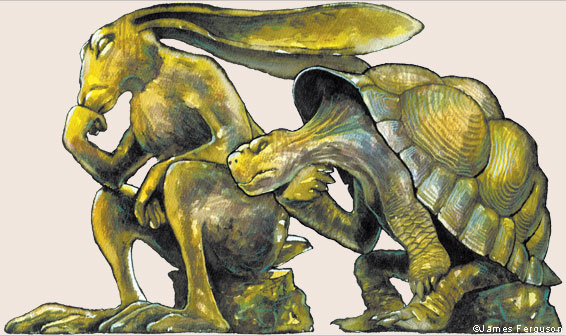zengrifter
Banned
Thinking, Fast and Slow
Review by William Easterly / FT.com
Why even experts must rely on intuition and often get it wrong

There have been many good books on human rationality and irrationality, but only one masterpiece. That masterpiece is Daniel Kahneman’s Thinking, Fast and Slow.
Kahneman, a winner of the Nobel Prize for economics, distils a lifetime of research into an encyclopedic coverage of both the surprising miracles and the equally surprising mistakes of our conscious and unconscious thinking. He achieves an even greater miracle by weaving his insights into an engaging narrative that is compulsively readable from beginning to end.
Kahneman presents our thinking process as consisting of two systems.
System 1 (Thinking Fast) is unconscious, intuitive and effort-free.
System 2 (Thinking Slow) is conscious, uses deductive reasoning and is an awful lot of work.
System 2 likes to think it is in charge but it’s really the irrepressible System 1 that runs the show. There is simply too much going on in our lives for System 2 to analyse everything. System 2 has to pick its moments with care; it is “lazy” out of necessity.
Books on this subject tend to emphasise the failings of System 1 intuition, creating an impression of vast human irrationality. Kahneman dislikes the word “irrationality” and one of the signal strengths of Thinking, Fast and Slow is to combine the positive and negative views of intuition into one coherent story. In Kahneman’s words, System 1 is “indeed the origin of much that we do wrong” but it is critical to understand that “it is also the origin of most of what we do right – which is most of what we do”.
The “marvels” of System 1 include an ability to recognise patterns in a fraction of a second, so that it will “automatically produce adequate solutions to challenges”. An even more remarkable accomplishment is “expert intuition”, in which after much practice a trained expert, such as a doctor or a firefighter, can unconsciously produce the right response to complex emergencies. The classic example is the firefighting captain who correctly anticipates that a house on fire is about to explode and gets his team out in time yet cannot articulate why he knew that.
MORE- http://www.zenzoneforum.com/threads/19936-Thinking-Fast-and-Slow
Review by William Easterly / FT.com
Why even experts must rely on intuition and often get it wrong

There have been many good books on human rationality and irrationality, but only one masterpiece. That masterpiece is Daniel Kahneman’s Thinking, Fast and Slow.
Kahneman, a winner of the Nobel Prize for economics, distils a lifetime of research into an encyclopedic coverage of both the surprising miracles and the equally surprising mistakes of our conscious and unconscious thinking. He achieves an even greater miracle by weaving his insights into an engaging narrative that is compulsively readable from beginning to end.
Kahneman presents our thinking process as consisting of two systems.
System 1 (Thinking Fast) is unconscious, intuitive and effort-free.
System 2 (Thinking Slow) is conscious, uses deductive reasoning and is an awful lot of work.
System 2 likes to think it is in charge but it’s really the irrepressible System 1 that runs the show. There is simply too much going on in our lives for System 2 to analyse everything. System 2 has to pick its moments with care; it is “lazy” out of necessity.
Books on this subject tend to emphasise the failings of System 1 intuition, creating an impression of vast human irrationality. Kahneman dislikes the word “irrationality” and one of the signal strengths of Thinking, Fast and Slow is to combine the positive and negative views of intuition into one coherent story. In Kahneman’s words, System 1 is “indeed the origin of much that we do wrong” but it is critical to understand that “it is also the origin of most of what we do right – which is most of what we do”.
The “marvels” of System 1 include an ability to recognise patterns in a fraction of a second, so that it will “automatically produce adequate solutions to challenges”. An even more remarkable accomplishment is “expert intuition”, in which after much practice a trained expert, such as a doctor or a firefighter, can unconsciously produce the right response to complex emergencies. The classic example is the firefighting captain who correctly anticipates that a house on fire is about to explode and gets his team out in time yet cannot articulate why he knew that.
MORE- http://www.zenzoneforum.com/threads/19936-Thinking-Fast-and-Slow
